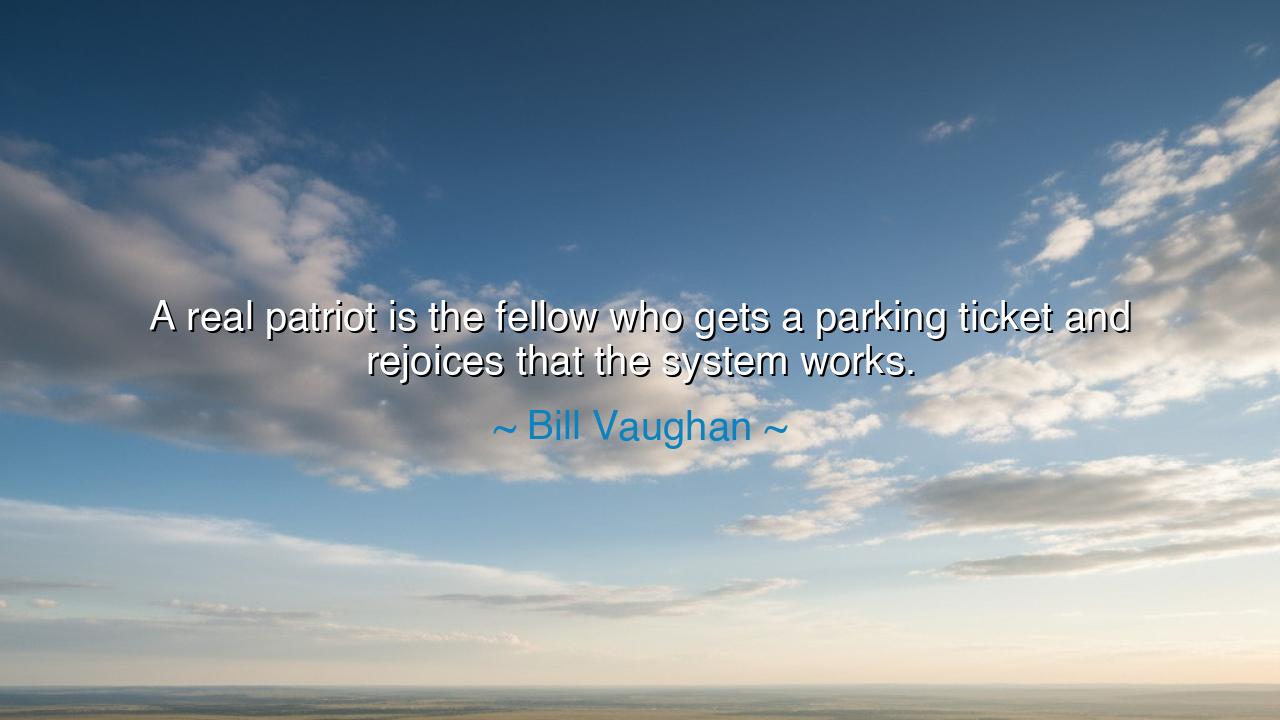
A real patriot is the fellow who gets a parking ticket and
A real patriot is the fellow who gets a parking ticket and rejoices that the system works.






Bill Vaughan, with the humor of a sage cloaked in jest, once declared: “A real patriot is the fellow who gets a parking ticket and rejoices that the system works.” Though the words sparkle with wit, beneath them lies a profound wisdom about the nature of patriotism. For true love of country is not shown only in battlefields or in stirring speeches; it is revealed in the quiet acceptance of law, in the recognition that justice applies not only to others, but also to oneself. A nation is truly alive when its citizens obey and honor its laws—even when those laws inconvenience them.
The origin of Vaughan’s saying reflects the deep currents of democratic thought. In societies built on the rule of law, fairness must reach even the smallest matters, from the highest courts to the humblest streets. The patriot, therefore, is not the man who demands exemption from rules, but the one who rejoices that rules are upheld impartially, even against him. To celebrate a parking ticket is to acknowledge: “The system that restrains me also protects me, and in its even hand lies the strength of my nation.”
History offers us echoes of this truth. In the ancient city of Athens, citizens prided themselves not merely on their freedom, but on their obedience to the law. Socrates himself, though condemned unjustly, refused to flee into exile. He accepted the cup of hemlock, declaring that respect for law was greater than the desire for personal escape. Here was the spirit of Vaughan’s humor in tragic form: to rejoice that the system works, even when it works against you. For in such fidelity lies the health of the whole.
The danger Vaughan mocks is the counterfeit patriotism that cries for freedom but despises restraint. Many call themselves patriots when law shields their interests, but denounce it as tyranny when it touches their own desires. They wave flags, yet rage at a fine. They speak of liberty, yet seek exemption from the rules that preserve liberty for all. Such men mistake selfishness for patriotism. But the true patriot, like Vaughan’s fellow with the parking ticket, accepts discipline as the price of freedom.
This teaching is not small; it is great. For if citizens cannot accept justice in small matters, how shall they uphold it in great ones? The strength of a nation is tested not only in war, but in daily obedience—in paying taxes honestly, in following laws faithfully, in respecting the rights of neighbors. Each ticket, each rule, each restraint is a thread that, woven together, holds the fabric of the Republic. To tear at those threads is to unravel the whole.
The lesson for us is clear: rejoice not only in the blessings of liberty, but in the burdens of responsibility. When the law finds you, accept it as proof that the system lives. Do not seek privilege or exemption, but equality before the law. In this humility lies the truest strength of a citizen. To bear the small cost of obedience is to safeguard the great treasure of freedom.
Therefore, let Vaughan’s jest be heard as a teaching. A real patriot is not he who escapes the law, but he who submits to it for the sake of all. He rejoices that the system works, even when it inconveniences him, for he knows that in this shared burden lies the common good. Let us, then, love our country not only with words or songs, but with obedience, humility, and joy in the fairness of law.
So remember this: when next the hand of justice touches you, be it in small matters or in great, do not curse but give thanks. For the system that binds you binds all, and in that binding lies freedom itself. Such is the wisdom hidden in Vaughan’s laughter, and such is the mark of the real patriot.






AAdministratorAdministrator
Welcome, honored guests. Please leave a comment, we will respond soon